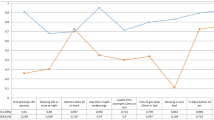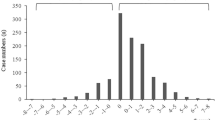Abstract
The aim was to examine the interrelationship between sleep quality of 1-month infants and mothers, mothers’ corresponding activities to infant’s night sleep, and mother’s mental health. A cross-sectional survey with self-reported questionnaire was conducted among 437 healthy mother–infant pairs at 1-month postpartum delivered at a maternal hospital in Tokyo. The main measurements were the presence of mother’s sleep problem, the presence of infant’s unstable sleep quality (hereinafter, unstable sleep), mother’s stimulating activities, such as responding to active sleep immediately, and four indices of mothers’ mental health. After comparing statistically, the basic characteristics and above main measurements with and without infant unstable sleep, a covariance structure analysis was conducted to investigate the association among four main measurements according to the hypotheses made based on previous studies. The infants’ unstable sleep affected the mothers’ sleep problem (β = 0.12), the mothers’ sleep problem affected the stimulating activities (β = 0.11) and the stimulating activities affected the infants’ unstable sleep (β = 0.11). The infants’ unstable sleep and mothers’ sleep problem affected the mothers’ mental health directly (β = 0.20, β = 0.15). The values of GFI (0.993, AGFI (0) and RMSEA (0.032) showed a high fitness of the model. The inter-relationships between the infants’ unstable sleep, mothers’ sleep problem, mothers' stimulating activities, and mothers’ mental health were verified in just 1 month post birth. It is significant that those relationships were obtained in the neonatal periods. The result that mothers’ stimulating activities affect infants’ unstable sleep is important with implications on sleep health education.



Similar content being viewed by others
References
Stremler R, Sharky KM, Wolfson AR. Postpartum period and early motherhood. In: Kryger M, Roth T, Dement WC, editors. Principles and practice of sleep medicine. 6thth ed. Philadelphia: Elsevier; 2017. p. 1547–1552.
Goyal D, Gay C, Lee K. Fragmental maternal sleep is more strongly correlated with depressive symptoms than infant’s temperament at three months postpartum. Arch Women’s Ment Health. 2009;12:229–37.
Dørheim SK, Bondevik GT, Eberhard-Gran M, Bjorvatn B. Sleep and depression in postpartum women; a population-based study. Sleep. 2009;32:847–55.
Baird J, Hill CM, Kendrick T, Inskip HM. Infant sleep disturbance is associated with preconceptional psychological distress: findings from the Southampton Women’s Survey. Sleep. 2009;32:566–8.
Martin J, Hiscock H, Hardy P, Davey B, Wake M. Adverse associations of infant and child sleep problems and parent health: an Australian population study. Pediatrics. 2007;119:947–55.
Dennis CL, Ross L. Relationships among infant sleep patterns, maternal fatigue, and development of depressive symptomatology. Birth. 2005;32:187–93.
Kurth E, Kennedy HP, Spichiger E, Hösli I, Stutz EZ. Crying babies, tired mothers: what do we know? A systematic review. Midwifery. 2011;27:187–94.
Tikotzky L. Postpartum maternal sleep, maternal depressive symptoms and self-perceived mother–infant emotional relationship. Behav Sleep Med. 2016;14:5–22.
Lee K, Zaffke ME, Mcenany G. Parity and sleep patterns during after pregnancy. Obstet Gynecol. 2000;95:14–8.
Montgomery-Downs HE, Insana SP, Clegg-Kraynok MM, Mancini LM. Normative longitudinal maternal sleep: the first 4 postpartum months. Am J Obstet Gynecol. 2010;203:465e1–467.
Anders TF, Sadeh A, Appareddy V. Normal sleep in neonates and children. In: Ferber R, Krieger M, editors. Principles and practice of sleep medicine in the child. Philadelphia: W.B. Saunders Company; 1995. p. 7–18.
Stremler R, Hodnett E, Lee K, MacMillan S, Mill C, Ongcangco L, Willan A. A behavioral-educational intervention to promote maternal and infant sleep: a pilot randomized, controlled trial. Sleep. 2006;29:1609–15.
Pinilla T, Birch LL. Help me make it through the night: behavioral entrainment of breast-fed infants’ sleep patterns. Pediatrics. 1993;91:436–44.
Wolfson A, Lacs P, Futterman A. Effects of parent training on infant sleep patterns, parents’ stress, and perceived parental competence. J Consult Clinical Psychol. 1992;60:41–8.
Adachi Y, Sawa R, Ueda M, Shimai S. The relationship between sleep and subjective mental health at one month postpartum in Japanese women. Jpn J Public Health. 2018;65:646–54 ([Nihon Kōshū Eisei Zasshi] in Japanese).
Hayama J, Adachi Y, Nishino N, Ohryoji F. Impact of parenting behavior relevant to infant’s sleep on maternal sleep and health. Japanese J Public Health. 2008;55:693–700 (Nihon Kōshū Eisei Zasshi in Japanese).
Adachi Y, Sato C, Nishino N, Oryoji F, Hayama J, Yamagami T. A brief parental education for shaping sleep habits in 4-month -old infants. Clin Med Res. 2009;7:85–92.
Mindell JA. Empirically supported treatments in pediatric psychology: bedtime refusal and night wakings in young children. J Pediatric Psychol. 1999;24:465–81.
Ramchandani P, Wiggs L, Webb V, Stores G. A systematic review of treatments for settling problems and night waking in young children. BMJ. 2000;320:209–13.
Kerr S, Jowett S. How to help your baby sleep well, Department of Nursing & Midwifery Studies University of Glasgow, 1993.
Schmitt BD. The prevention of sleep problems. Clin Perinatol. 1985;12:453–7.
Lee KA, Gay CL. Can modification to bedroom environment improve the sleep of a new parents? Two randomized control trial. Res Nurs Health. 2011;34:7–19.
Hiscock H, Cook F, Bayer J, Le H, Mensah F, Cann W, Symon B, James-Roberts I. Preventing early infant sleep and crying problems and postnatal depression: a randomized trial. Pediatrics. 2014;133:e346–e354354.
Kempler L, Sharpe L, Bartlett D. Sleep education during pregnancy for new mothers. BMC Pregnancy Childbirth 2012; 12:155. https://www.biomedcentral.com/1471-2393/12/155.
Stremler R, Hodnett E, Kenton L, Lee K, Weiss S, Wenston J, Willan A. Effect of behavioral-educational intervention on sleep for primiparous women and their infants in early postpartum: multisite randomized controlled trial. [BMJ2013].https://www.bmj.com/content/bmj/346/bmj.f1164.full.pdf. 14 Mar 2017.
The Association for Preventive Medicine of Japan. The childcare support for mothers by lifestyle habits improvement and parent skill education from pregnancy to postpartum. 2010 The report of a grant project from Welfare Medical Organization of Independent Administrative Institution.
Bentler PM, Yuan KH. Structural equation modeling with small samples: test statistics. Multivar Behav Res. 1999;34:181–97.
Camerota M, Propper CB, Teti DM. Intrinsic and extrinsic factors predicting infant sleep. Dev Rev. 2019;53:100871. https://doi.org/10.1016/j.dr.2019.1008717Aug2020.
Douglas J. Training parents to manage their child’s sleep problem. In: Schaefer CE, Briesmeister JM, editors. Handbook of Parent Training. New York: Wiley Interscience; 1989. p. 13–37.
Mindell JA, Kuhn B, Lewin DS, Meltzer LJ, Sadeh A. Behavioral treatment of bedtime problems and night wakings in infants and young children. Sleep. 2006;29(10):1263–76.
American Academy of Pediatrics. Your child’s sleep. In Shelov SP(Editor-in-chief) Caring for your baby and young child. Bantam Books, USA, 2009, pp 837–848.
Mindell JA, Owens JA. Sleep in infancy, childhood, and adolescence. In: A Clinical Guide to Pediatric Sleep. Lippincott Williams & Wilkins, Philadelphia, 2003 pp 22–41.
Ueda M, Adachi Y, Kotake K, Kubota T. Relationships between physical activities and mental health after childbirth. Jpn J Maternal Health. 2014;55:350–9 (Bosei Eisei in Japanese).
Lillis TA, Hamilton NA, Pressman SD, Khou CS. The association of daytime maternal napping and exercise with nighttime sleep in first-time mothers between 3 and 6 months postpartum. Behav Sleep Med. 2019;2017(00):1–16. https://doi.org/10.1080/15402002.2016.123958015Feb.
Acknowledgements
In this study, we received a grant from the National Health and Welfare Organization “Longevity, Parenting, Disability Fund” and The Mental Health Okamoto Memorial Foundation. There is no COI to disclose.
Author information
Authors and Affiliations
Corresponding author
Additional information
Publisher's Note
Springer Nature remains neutral with regard to jurisdictional claims in published maps and institutional affiliations.
Rights and permissions
About this article
Cite this article
Adachi, Y., Katsuki, T., Ueda, M. et al. Interrelationship between sleep quality of 1-month old infants and their mothers’ corresponding activities. Sleep Biol. Rhythms 19, 45–54 (2021). https://doi.org/10.1007/s41105-020-00286-6
Received:
Accepted:
Published:
Issue Date:
DOI: https://doi.org/10.1007/s41105-020-00286-6




